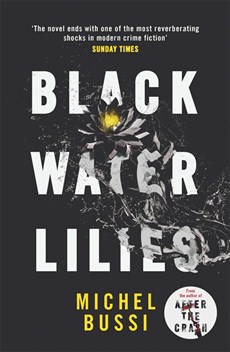Death by Monet: Black Water Lilies by Michel Bussi
14 Thursday Feb 2019
Written by Charles Harris in Books, Crime, Reviews, The Library Corner, Thriller
Black Water Lilies review

The struggles of three women – a child, a school-teacher and an elderly woman about to be widowed – intertwine in this award-winning crime thriller which takes place over 13 days and whose ending, according to the cover testimonial delivers “one of the most reverberating shocks in modern crime fiction”.
But can the book – and that ending – live up to the hype?
Black Water Lilies
Michel Bussi is a prodigious figure in French crime fiction, producing a book a year and winning multiple awards.
Usually, though not always, set in Normandy, where he is a political analyst and geography professor, his detective novels will often play games with a reader’s genre expectations.
Black Water Lilies (French title Nymphéas noirs) takes place in the (mostly authentic) old Norman village of Giverny, home to the great painter Claude Monet, and much of the fun comes from the acutely observed tensions of a small village that finds it has become a major world tourist destination.
The novel opens with the murder of local ophthalmologist and art collector. Jérôme Morval, killed in a way that seems to offer strange resonances with the past.
But the more the two detectives investigate, the less any of the clues seem to add up. Was this a crime of passion? Or is there some shady dealing with art and money behind it? Or something to do with the village children?
The plot grows even more problematic when the lead detective, Laurenç Sérénac becomes romantically obsessed with one of the suspects.
Three women
Bussi beautifully evokes life in this little village, overrun by tourists by day, who then desert it by night. He captures the beauty of this rural idyll, along with the art that it inspired – but never loses sight of the rather uglier human emotions that run close to the surface.
At its heart are the three characters who dominate the story. The older woman, who narrates alternate sections and whose name we are not given until close to the end, is an intriguing creation.
She describes both villagers and tourists with an acid wit, and provides a brooding presence as she prowls around the crime scene, largely unnoticed (as she comments) because people don’t notice old women.
The young girl – Fanette – herself a talented painter at almost eleven years old, brings energy and a joy in her own talent.
While between them, in age at least, is the femme fatale – Stéphanie. Is she a potential victim herself, or is she seducing Detective Sérénac for more nefarious reasons?
Stymied by his own plot?
And here my problems start. Because, while the central characters are initially intriguing and well-painted (pun intended) they never fully develop. This could in part be because Bussi is stymied by his own plot.
It is one of the more awkward challenges for a writer. The cleverer your final reveal is going to be, the more difficult it becomes to allow your characters to reveal themselves interestingly earlier in the book.
You simply have to hide too much about them, or you’ll blow the surprise at the end.
As a result, the secondary characters in the book threaten to become more engaging than the protagonists.
Not least, Sérénac’s eager puppy of an assistant, Bénavides, with his increasingly desperate attempts to distil the investigation into thoughtful diagrams and to balance his detective work with supporting his heavily pregnant wife.
Apologies
Another unfortunate side-effect is a necessary amount of padding. The elderly co-narrator tells us up-front that she knows most of the answers. But obviously can’t give them to us without spoiling the book.
This forces her into constant apologies and promises – such as “Patience, patience. A few more days…” and “you won’t be disappointed!” which grow weary with repetition.
This also leads at times to a rather overwrought tone. This could, of course, be the fault of Shaun Whiteside’s English translation, but feels unlikely given the overall quality elsewhere in the book.
Shock ending
Which brings me to the “most reverberating shock” ending (© Sunday Times).
No, I’m not going to give it away. It is indeed a surprise, though I can hardly say the biggest ever. But more importantly, the first rule of a surprise ending is not to cheat.
The reader should be able to gasp with the shock of surprise recognition. And then be able to go back over the book to find the writer never actually lied.
Bussi almost gets away with it. But, in at least one essential, he cheats. There are lines in the first chapter – “Day One” – of the investigation, which do more than misdirect. In my opinion, they implicitly twist the truth.
Don’t get me wrong. Black Water Lilies may not be flawless, but it is a good yarn. The characters are unusual – and the setting enchanting.
You will want to find out the ending (even if you grind your teeth as I did).
And for all my doubts, I did find the final chapters to be truly moving. And I can’t say that about many books in any genre.


2 Comments
February 14, 2019 at 5:48 pm
Great review. Intriguing. . . 💕📚 Personally, I get tired of reading covers that promise ‘a shocking twist you won’t see coming’. . . They rarely live up to the hype, and I totally agree with your comments on ‘cheating’ and misdirection. Perhaps with the large number of people with the attention span of gnats, we are not expected to remember in any great detail what we read in the beginning of the book.
February 15, 2019 at 10:56 am
Thank you. I agree. As I writer, I know how easy it is to be seduced by your own plot twists and that you have to remember to respect the reader’s intelligence. That’s the challenge.